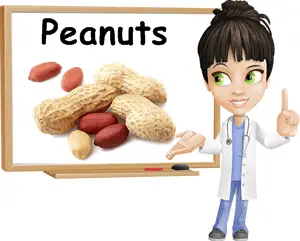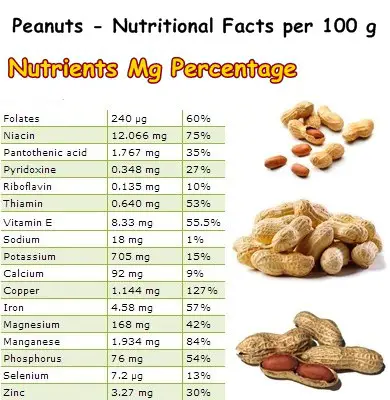On the contrary to what their name suggests, peanuts (Arachis hypoagea) are not genuine nuts. They are actually related to legumes (Leguminosae) such as beans, peas, chickpeas and lentils. Still, they are used as culinary nuts and labelled as such as well. Regardless of their classification, peanuts are a truly healthy food choice. Not only are they a wonderful source of B vitamins and vitamin E, but they are also rich in copper, manganese, phosphorus and iron. They boast a high protein content and contain a variety of antioxidant compounds.
Some studies suggest that they may have a higher antioxidant value than strawberries, carrots and even blackberries. And there is more. Many people believe peanuts, like most other nut varieties, grow on mighty trees. However, they actually grow underground, just like potatoes, hence the alternate name groundnut. I must admit I was a bit surprised when I first found out about this, but, as it turns out, legumes are quite the surprising food family. Did you know that alfalfa, tamarind and clover are also legumes like peanuts?

What do peanuts look like?
The plant looks similar to a potato plant, an almost half a meter tall plant with a rich, green foliage and an almost bushy appearance. The leaves have four leaflets each and look similar to clover. The plant has small, yellow flowers tinged with orange at the edges. The nuts grow underground, like potatoes. Peanuts are enclosed in a hard, creamy-white shell, known as a peanut pod, hence the kinship with the legume family whose members also come from pods. Each pod contains one to four seeds with a fine, reddish-brown seed coat. Underneath, the seeds are cream colored.
What do peanuts taste like?
Peanuts taste really good. They have a pleasant, slightly oily, but rich nutty flavor and a crisp texture. The nutty-oily flavors are a result of their rich fatty acid content. The seeds are a rich source of healthy monounsaturated Omega-9 and polyunsaturated Omega-6 fatty acids and a source of edible oil. Peanut butter made from them is a healthy food and a great source of vitamins, minerals, fats and protein.

Nutrition facts and health benefits of Peanuts
Studies conducted over the years reveal that these darling pseudo-nuts are an incredibly rich source of healthy unsaturated fats which promote cardiovascular health by exerting an antioxidant effect on blood vessels, protecting them from oxidation. In addition to this, being high protein and providing all 9 essential amino acids are what makes them ideal for vegetarian recipes and diets. Their content of healthy fats make them a great food choice for students because they help maintain brain health and support cognitive performance.
Interesting facts
Peanuts supply generous amounts of vitamins and minerals and are marked as a nutritionally-dense food. Because of their dense nutritional value, peanut-based foods are used to combat severe malnutrition.
About 100 g of seeds provide us with significant amounts of niacin, folate, thiamine, pantothenic acid and pyridoxine. Eating foods rich in B vitamins supports normal metabolism, digestive and nervous system activity and ensures the proper synthesis of carbohydrates, fats and proteins from food and their subsequent conversion into energy to meet our body’s energy demands. In other words, eating peanuts is good for you because it boosts energy levels, supports thinking, learning and other cognitive processes and regulates digestion.
Moreover peanuts are a rich source of vitamin E, a fat-soluble nutrient, essential for good health. Vitamin E is known as an excellent skin emollient, moisturizing skin and helping keep it hydrated and healthy. But some of the most important benefits of vitamin E are that it helps protect the skin from UV rays and their damaging effects as well as prevent digestive problems and immune system disorders. Peanuts are pretty impressive, right?
Another great benefit of peanuts is that they help increase the absorption of nutrients from food. For example, vitamins E, D, A and K are fat-soluble nutrients, meaning they only get absorbed with fats. Fortunately, peanuts are rich in healthy fats that help us take in these essential nutrients we couldn’t live without.
As far as minerals are concerned, peanuts provide more than generous amounts of copper (127% of recommended daily intake, RDI), manganese (84%), iron (57%), phosphorus (54%), magnesium (42%), zinc (30%) and selenium (13%). Copper, for instance, supports the production of melatonin, a hormone which, among other things, improves the quality of one’s sleep and prevents premature aging like premature hair graying or iris discoloration and loss of vision acuity as a result of old age.

Magnesium increases the absorption of calcium in bones and supports muscle activity, heart included, not to mention it has been found to improve nervous system conditions like anxiety or depression. In type 2 diabetes and pre-diabetes, it has been shown to have blood sugar-lowering properties. Also see: can you eat peanuts with diabetes?
Zinc strengthens the immune system and offers better protection against infection and disease. Selenium is vital for good thyroid hormone production and a sufficient intake reduces our risks of hypothyroidism.
Last but not least, peanuts boast an impressive antioxidant content. Antioxidants are basically natural substances capable of protecting us from reactive oxygen molecules known as free radicals by inhibiting their disease-inducing activity. Peanuts contain p-coumaric acid, also found in garlic, carrots, beans and pollen. This powerful antioxidant is believed to have anticancer properties and is believed to offer a certain degree of protection from stomach cancer in particular. What is even more interesting is the fact that roasting can increase the general antioxidant content of peanuts by 20%.
However, remember not to add salt. If you roast or toast any variety of nuts at home, leave them simple. Sodium is detrimental for human health because it causes water retention and cardiovascular problems. A high sodium intake counteracts the beneficial properties of potassium and can lead to extrasystoles, palpitations, arrhythmia and high blood pressure, even cardiovascular events. Whenever possible, it is best to choose unsalted products, peanuts included. They already have everything our body needs to keep us in good health.
Peanuts side effects
Peanuts are a great food, provided you are not allergic to them. However, if you are allergic, it is important to avoid them and every food item containing them because they are a serious allergen and can cause anaphylactic shock. So read the label on your foods to know whether or not they contain or may be contaminated with peanuts. Also, remember that a good diet is all about moderation. As healthy as a food may be in the right amounts, if you eat too much of it, then it stops being beneficial. Similarly, peanuts are great for you in moderate amounts, but can become bad for you if you eat too much of them.
Conclusion
If you have already or plan on taking up a sport that requires physical strength or is particularly tiresome, you could include peanuts into your diet. Their high protein content will surely help keep your energy levels high, which will surely motivate you to achieve your goals. Similarly, if you are looking for a great food for your brain, peanuts are definitely a wonderful choice. Rich in vitamins and dietary minerals, they have a beneficial action on digestive, cardiovascular, nervous and immune system health and provide a wide range of wonderful health benefits.
